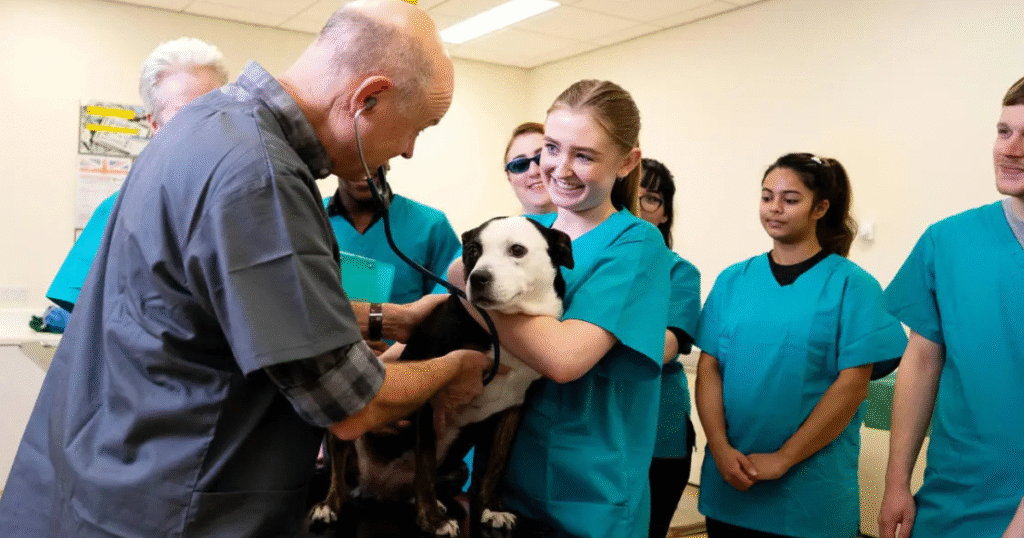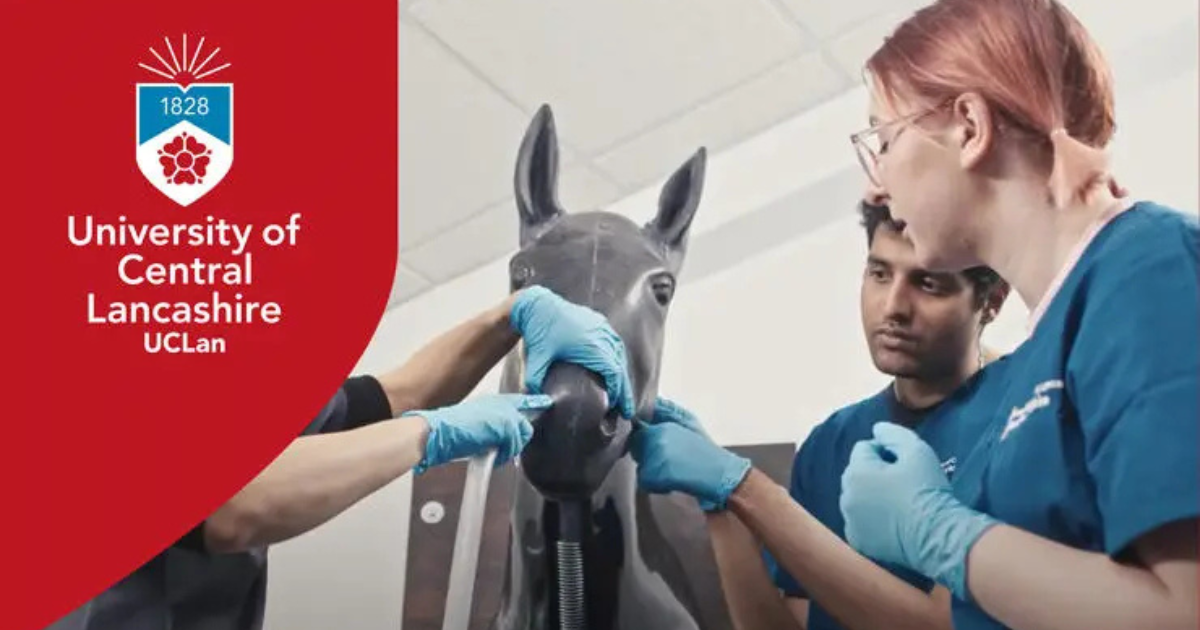Veterinary science is an important and exciting field. It involves the care of animals and the study of animal health. Many people are passionate about animals and want to work as veterinarians.
After finishing the course, graduates must complete a licensing exam to practice as a vet. Some universities offer additional opportunities for postgraduate studies in veterinary fields.
If you are one of them, you might be wondering if UK universities offer veterinary courses. This article will answer this question and provide useful information about veterinary courses in the UK.
Introduction To Veterinary Science
Veterinary science is the branch of science that focuses on the health and well-being of animals. It is similar to medicine for humans but specifically for animals.
- Veterinary Science in UK universities offers a comprehensive study of animal health, medicine, and surgery.
- The curriculum covers a wide range of topics, including anatomy, pathology, and animal behavior.
- Most veterinary programs in the UK require high academic standards, including science-focused A-levels or equivalent qualifications.
- Practical training in clinical settings is an essential part of veterinary programs, ensuring hands-on experience.
- Graduates of veterinary science programs can pursue careers in animal care, research, and public health.
A veterinarian or vet is a trained professional who diagnoses and treats animals. They also prevent diseases and provide health care to pets, livestock, and wildlife.
Importance Of Veterinary Science
Veterinary science plays a key role in maintaining the health of animals. It is also vital for public health because many diseases can be transmitted between animals and humans. Veterinarians work to prevent and treat these diseases. They also ensure the safety of food supplies by checking animals for diseases before they enter the food chain.
UK Universities Offering Veterinary Courses
Yes, UK universities offer veterinary courses. There are several universities in the UK that offer veterinary medicine programs. These programs are designed to provide students with the knowledge and skills required to become a veterinarian.
The courses are highly competitive, and students must meet strict entry requirements to be accepted. Some of the top universities, like the University of Glasgow, offer specialized programs. Students in these courses get hands-on experience with animals, learning how to diagnose and treat various animal health problems.
After completing their studies, graduates can work in animal hospitals, farms, or even wildlife conservation. Veterinary courses in the UK are known for their high-quality education and research opportunities.
Top Universities For Veterinary Courses
The UK is home to some of the best veterinary schools in the world. Some of the top universities offering veterinary courses include:
- University of Cambridge
- University of Edinburgh
- University of Glasgow
- University of Liverpool
- University of Bristol
- Royal Veterinary College (RVC) London
These universities are known for their high-quality veterinary programs and strong reputations in the field.
Entry Requirements For Veterinary Courses
To get into a veterinary course in the UK, you need to meet certain academic and personal requirements. Here are some common entry requirements for veterinary programs:
- A strong background in science subjects, such as biology, chemistry, and physics.
- High A-level grades or equivalent qualifications (often AAA or higher).
- A good understanding of animal biology and health.
- Relevant work experience with animals.
- Some universities also require applicants to pass an entrance exam or interview.
It’s important to research the specific entry requirements for each university.
Duration Of Veterinary Courses
Veterinary courses in the UK typically last five to six years. The exact duration depends on the university and the specific program. The first few years of the program are usually focused on theoretical learning, while the later years focus on practical training.
The course also includes practical training in veterinary clinics. After finishing the course, graduates must complete a licensing exam to practice as a vet. Some universities offer additional opportunities for postgraduate studies in veterinary fields.
Structure Of Veterinary Programs
The structure of veterinary programs can vary slightly between universities. However, most veterinary courses have a similar structure. Here is a general breakdown of what to expect during your studies:
- Years 1-2: Basic science subjects, including biology, chemistry, and anatomy.
- Year 3: Introduction to clinical practice and more specialized subjects, such as microbiology and pharmacology.
- Year 4: Advanced clinical training, including practical experience with animals.
- Year 5: Final year, where students complete clinical rotations and gain hands-on experience in veterinary clinics and hospitals.
Types Of Veterinary Courses in The UK
Some universities also offer veterinary nursing programs, which focus on animal care and supporting veterinarians. There are several different types of veterinary courses available in the UK. Common veterinary courses include:
- Veterinary Medicine: The most common course for those wanting to become a veterinarian.
- Veterinary Nursing: A course for those who want to assist veterinarians in clinics and hospitals.
- Animal Science: A broader course that focuses on animal biology, welfare, and management.
- Wildlife Conservation: A course for those interested in the protection and care of wildlife.
Some are focused on different aspects of veterinary science. These courses are available at several top universities across the UK, with a focus on both practical skills and scientific knowledge.

The Royal Veterinary College (RVC)
The Royal Veterinary College (RVC) in London is one of the most prestigious institutions in the UK for veterinary education. The RVC offers both undergraduate and postgraduate veterinary courses. Their veterinary programs are designed to equip students with the skills and knowledge to work in a wide range of veterinary careers.
University Of Cambridge
The University of Cambridge is another top choice for veterinary studies. It is known for its world-class research and teaching in veterinary science. The university offers a veterinary medicine course that prepares students for a career as a veterinarian. The program includes both theoretical learning and practical experience in veterinary clinics.
University Of Edinburgh
The University of Edinburgh has a highly regarded veterinary school. The university offers a Bachelor of Veterinary Medicine and Surgery (BVMS). It is one of the most popular veterinary programs in the UK. The program includes comprehensive training in animal health, surgery, and clinical practice.
University Of Glasgow
The University of Glasgow offers a veterinary medicine course that is recognized worldwide. Students receive training in both the theoretical and practical aspects of veterinary care. The university also has strong links with veterinary clinics, providing students with opportunities for hands-on experience.
University Of Liverpool
The University of Liverpool is another great option for veterinary students. The veterinary medicine program at Liverpool focuses on animal health, welfare, and clinical skills. Students also get the chance to gain experience in various veterinary settings, including clinics and farms.
University Of Bristol
The University of Bristol offers a veterinary science course that is highly respected in the field. The program is designed to train students to become competent and compassionate veterinarians. It includes both academic studies and practical training in various veterinary practices.
The Cost Of Studying Veterinary Medicine in The UK
The cost of studying veterinary medicine in the UK can be high. Tuition fees vary depending on the university and the course. On average, international students can expect to pay between £20,000 and £40,000 per year for tuition fees. In addition to tuition fees, students will also need to budget for living expenses, books, and equipment.
Career Opportunities After Graduation
After completing a veterinary course in the UK, graduates can pursue a wide range of career opportunities. Some of the most common career paths for veterinarians include:
- Working in private veterinary practices.
- Treating animals in animal hospitals.
- Working with livestock on farms.
- Conducting research in veterinary science.
- Working with wildlife and in conservation.
Veterinarians can also work in various industries, such as pharmaceutical companies, animal welfare organizations, and government agencies.
Job Prospects And Salaries
The job prospects for veterinarians in the UK are generally good. There is a strong demand for qualified veterinarians, especially in rural areas. Some may also work in research, animal welfare organizations, or as veterinary consultants.
Specialized vets, such as those working with exotic animals, can earn even higher salaries. The salary for a newly qualified veterinarian in the UK is typically around £30,000 to £35,000 per year. However, salaries can increase significantly with experience.
Work Experience And Internships
Most veterinary courses in the UK require students to gain practical work experience before they graduate. This can include placements in veterinary clinics, animal shelters, or farms. Gaining this experience is crucial for developing the skills needed to work as a veterinarian.
Becoming a veterinarian in the UK can be a highly rewarding career. It requires a lot of dedication, but it offers the chance to make a difference in the lives of animals. If you are passionate about animals and want to pursue a career in veterinary science, studying in the UK can provide you with the education and training you need.
Frequently Asked Questions
What are the entry requirements for veterinary courses in the UK?
To enter a veterinary course in the UK, you need to have good A-levels in science subjects, such as biology, chemistry, and physics. You also need relevant work experience with animals.
How long does it take to complete a veterinary course in the UK?
Veterinary courses in the UK usually last five to six years, depending on the program and university.
Are there scholarships available for veterinary students in the UK?
Yes, many UK universities offer scholarships for veterinary students. It is important to check the specific university’s website for details on available scholarships.
Can I work as a vet in the UK if I study veterinary medicine abroad?
If you study veterinary medicine abroad, you may still be able to work in the UK, but you will need to be registered with the Royal College of Veterinary Surgeons (RCVS).
What are the career prospects for veterinarians in the UK?
The career prospects for veterinarians in the UK are generally good, with opportunities in private practices, animal hospitals, farms, and wildlife conservation.

Final Thoughts
Pursuing a veterinary course in the UK can lead to a rewarding and fulfilling career. With high-quality education and excellent job prospects, the UK is an excellent choice for those passionate about veterinary science.
If you’re interested in animals and want to become a veterinarian, consider applying to one of the many prestigious veterinary schools in the UK. Veterinary professionals in the UK enjoy a rewarding career with a good salary and opportunities for growth.

